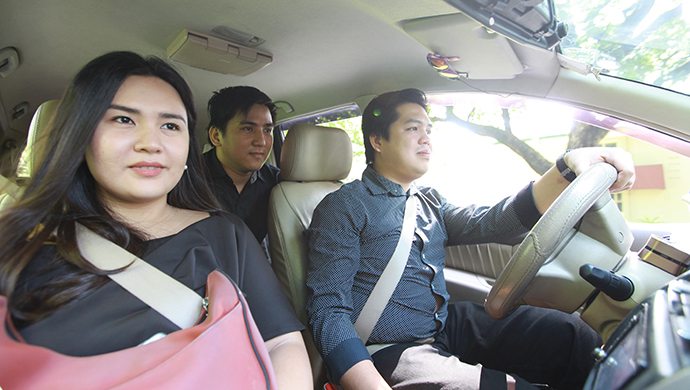In Metro Manila, December means traffic everywhere

Traffic jams are a way of life in the Philippines.
This is particularly the case in the country’s National Capital Region, more popularly known as Metro Manila, which last year was found to have the “worst traffic on Earth” based on a global evaluation by navigation app Waze.
The problem becomes even worse in December during the holiday season, when heavier traffic is an annual problem, even prompting calls in the Senate for the granting of emergency powers to the Philippine President to solve the traffic crisis.
In the face of this massive problem caused by traffic congestion, Hamburg-based startup Wunder aims to ease the plight of Metro Manila commuters by enabling ordinary citizens to build a carpooling community.
“What’s interesting about Wunder is that we have done a million carpools without adding a single new car to the road. In fact, sometimes we get questions online from for-profit drivers letting us know that the cost recovery rates we have set in app don’t make any sense because you can’t make a business driving people.” Wunder COO Sam Baker told e27 in an email interview.
“We are polite in our response to them, but of course this is exactly the point. We’re deliberately trying to avoid incentivising new car purchases as well as car owners taking any unnecessary trips outside the usual to work and home again,” he said.
This is what differentiates the Wunder carpooling app from other ridesharing apps such as Grab and Uber, which are both very popular in the Philippines. The two companies also have their own carpooling services, with Uber pushing uberPOOL and Grab recently launching GrabShare.
Wunder, however, single-mindedly focuses on enabling existing car owners to simply share empty seats in their vehicles while on their way to work.
“This means a maximum of two trips a day, to the office and home again. In exchange for some flexibility and planning ahead on the part of the passenger, they can contribute a small amount of money to help the driver cover their gas costs,” Baker said.
Baker even expressed the hope that Uber and Grab will succeed in their own initiatives to encourage this kind of ride sharing.
“We hope they can be as successful as Wunder has been in motivating more car owners to share empty seats in their cars, because putting more cars on existing roads is simply not possible in cities like Metro Manila,” he said.
From the time the Wunder app was launched in February in the Philippines, Baker said one of the benefits of the carpooling community is that members find it more convenient to just commute instead of bringing their cars to work.
“Because we ask Wunder community members in the app whether they have a car, we recently analysed car owners who have stopped driving in favor of riding in a Wunder carpool. We found that 25 per cent of community members are leaving their car at home and riding in someone else’s instead, taking a car off the road that would otherwise contribute to traffic. This shows the huge potential to make a dent in congestion if we can continue grow the community and increase the overall reliability of the carpooling network,” he said.
Baker also stressed the importance of collaboration with the government.
“We have always had a very open and collaborative approach with governments and Manila is no exception. Due to the non-profit, non-public nature of carpooling with other folks who are driving to work we don’t fall under any existing ‘taxi app’ labels and haven’t encountered resistance. On the contrary I’m excited to say that at the beginning of 2017 we will be announcing a pioneering public / private sector partnership to take even more cars off the roads in Metro Manila. This will be done with the support of the local government.”
This community-based approach is also seen in the fixed rates for the same routes, with the Wunder app informing drivers and passengers in advance how much the cost sharing will be.
Baker said this is also why Wunder does not have any promos or incentives. The goal is simply to provide rides to passengers that cost roughly the same as public transport, while helping drivers recover some of the cost for their fuel.
“One thing that we try to remind new community members is that Wunder is not a professional transportation service like Grab or Uber. No one is ‘working for you’. All passengers or drivers expect reliable, responsive and respectful communication when you are coordinating rides with community members.”
Can a non-profit carpooling community really empower ordinary citizens in finding a solution to traffic congestion? Baker finds the actions of Wunder community members highly encouraging.
“I’m really astonished at how people can come together and organise themselves to create a self-organised, self-funded transportation network all centred around sharing,” he said.
“It gives me hope we can solve the issues of congestion in cities like Manila.”
Now that would be a Christmas wish come true.
The post Is it time to Wunder if a ‘carpooling community’ is the solution to traffic woes? appeared first on e27.